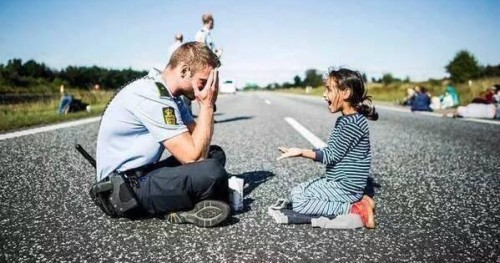PHOTO: A Danish policeman plays a game with a Syrian girl
Lindsay Hilsum of Britain’s Channel 4 News writes:
1. “They’re not refugees. They’re economic migrants.”
In the last three weeks on the road in Europe, about 80% of those I’ve met have been Syrians. I’ve also met Iraqis, Afghans, Bangladeshis, Pakistanis and Senegalese. The Syrians are fleeing war — no question. Bangladeshis and Senegalese are probably in search of a better life because of poverty and lack of opportunity at home.
With others it’s more complex. Continuing conflict in parts of Afghanistan and Iraq has made normal life impossible for many, but definitions blur. If you’re a young man whose father was killed in a car bomb in Baghdad and who cannot find work to support your mother and sisters, are you a refugee or an economic migrant? I’m not sure.
2. “They’re lying. They’re not really Syrians.”
Certainly the best nationality if you want to be accepted as a refugee now is Syrian. I suspect that some of those who told me they were Syrian may have been Iraqi. But I am not an idiot. I ask people where exactly in Syria they are from and chat about what’s happening there to see what they say. A translator has been helping me to distinguish Arabic accents. And when someone tells me he’s from war-torn Somalia and gives me a Nigerian name, then I know he’s lying.
3. “They pay thousands to people smugglers. This proves they’re not genuine refugees.”
You don’t have to be poor to fear Islamic State or President Bashar al-Assad’s barrel bombs. Even rich people flee war. Many of the Syrians fleeing now are middle-class, English-speaking and university educated, but after five years of war life has become impossible. Globalisation means that many have relatives abroad who send money by Western Union or other transfer services. The Eritrean diaspora is particularly well organised. This distinguishes the current refugee crisis from previous ones.
4. “Refugees stay in the first “safe” country they reach. If they leave they become economic migrants.”
Under the Dublin Protocol, refugees should claim asylum in the first European Union country they reach. Nowadays that usually means Greece or Italy. Neither can cope, so Greece just lets people through. This is not the fault of refugees but it’s true that most want to get to Germany or Sweden, where they may have relatives and where they know their children have a better chance of education and they may get work.
Syria’s neighbours — Jordan, Lebanon and Turkey — cannot cope with the four million Syrian refugees they’re hosting. Refugee families who had hoped that by now the war would be over and they could go back to their old lives in Aleppo or Idlib realise that’s not possible, but if they stay where they are their children will not go to school. They’ll live forever in camps or building sites with no hope of a future. So they move. So would you. They’re still fleeing war. This is why UNHCR [the UN agency for refugees] has asked European and other countries to accept more refugees from camps in neighboring countries, as Britain is now doing.
5. “They’ll be a burden on European societies.”
Initially, yes, it costs money to house and feed refugees. But refugees and migrants are often the most dynamic members of society. George Soros, for example. Or Einstein. I suspect one reason Germany is so open to Syrian refugees is because their society is ageing (like ours) so an injection of young, determined, often well-educated refugees might be quite helpful.
6. “They’re coming for the benefits.”
They’re coming because they want a future. Statistically, after an initial period of settling in, refugees and migrants are less likely to claim benefits than natives.
7. “They’re all men, which proves they’re not genuine refugees. They should fight for their country.”
Many of the “economic migrants” are young men who hope to get a job and send home money to their families. Remittances to Africa are more significant than economic aid. Amongst refugees I’ve seen groups of young men as well as families. It’s a mix.
Some young Syrian men are fleeing conscription into Bashar al Assad’s army. Others are disillusioned with the rebels. There are more than 2000 militia, including local groups, in Syria now. Joining one is not going to solve Syria’s problems. It’s entirely rational to flee not fight. (And men often take the dangerous journey alone hoping to get their families over separately later via a more safe route.)
8. “Terrorists are infiltrating Europe by posing as refugees.”
Actually it’s the other way round. European terrorists are going to Syria. If terrorists want to infiltrate Europe why bother to send them on a long, arduous journey? There are plenty of potential terrorists to recruit in Europe. Much cheaper and more efficient.
9. “You show pictures of cute children to pull our heartstrings.”
Guilty as charged. Part of our job as journalists is to show viewers how this feels. I’ve seen hundreds of kids on this journey and I find it incredibly affecting. The girl watching Macedonia speed by from the train window as her exhausted family slept around her. The smiling toddler whose mother had placed him in a luggage cart at Vienna station. The little boy at the Austrian border who forgot all his tiredness and fear because someone had given him a plastic brontosaurus. We have an instinctively sympathetic response to children because they’re necessary for the survival of the human race.
If we didn’t have empathy we’d have died out long ago. The story of humanity is a story of movement, migration, birth and adaptation. This is just a tiny chapter.
– See more at: http://blogs.channel4.com/lindsey-hilsum-on-international-affairs/refugee-myths-fears/5529#sthash.1wsh8KNy.dpuf

